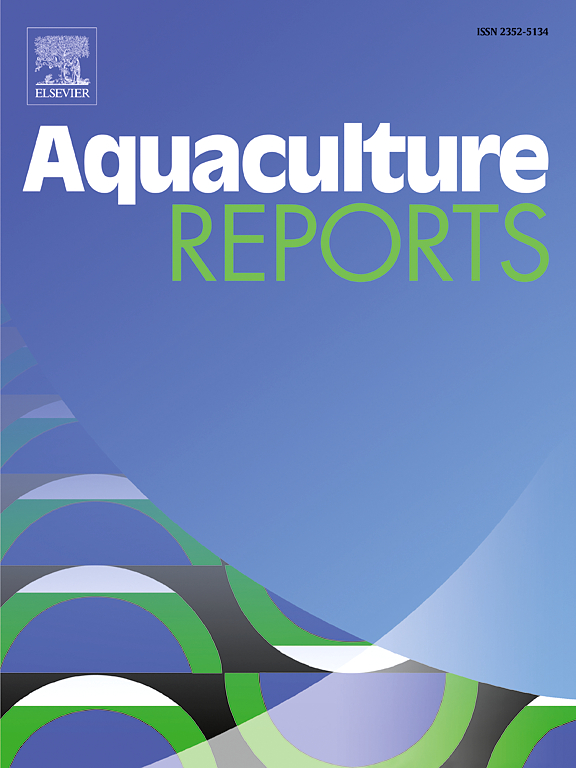Impact of zinc supplementation on growth, antioxidant status, and physiological health of Cyprinus carpio (Common Carp): Evaluating the optimal dietary zinc requirements
IF 3.7
2区 农林科学
Q1 FISHERIES
引用次数: 0
Abstract
Zinc is an essential micronutrient in fish that plays vital role in many biological functions. Optimal Zinc level is indispensable in fish feed due to its multifaceted roles specifically in growth, antioxidant capacity and overall aquaculture productivity. The impact of dietary supplementation with zinc methionine (ZM), zinc oxide nanoparticles (ZNPs) and zinc sulfate (ZS) was assessed in juvenile Cyprinus carpio. Fish were fed a basal diet (Control), ZM, ZNPs, and ZS based diets at levels of 10, 20, 30, and 40 mg/kg for 90 days. ZNPs at 20 mg/kg exhibited the maximum weight gain (137.46 ± 1.74 %) and specific growth rate (1.44 ± 0.01 %/day), with lowest feed conversion ratio (1.75 ± 0.021) compared to the ZM and ZS diet groups. Fish fed 20 mg/kg ZNPs showed significantly higher superoxide dismutase (SOD), catalase (CAT), glutathione peroxidase (GPx), and glutathione reductase (GR) activity, along with reduced liver thiobarbituric acid reactive substances (TBARS). Glucose level was lower in ZNPs groups as compared to other zinc sources, while cortisol levels decreased dose-dependently (p < 0.001). The highest protein level was observed in fish fed 20 mg/kg ZNPs. Serum and muscle zinc concentrations increased in dose dependent manner in the all zinc supplemented dietary groups. Optimal dietary zinc levels were identified for ZM (30.95–35.29 mg/kg), ZNPs (24.13–27.70 mg/kg), and ZS (30.15–33.37 mg/kg) based on growth and health markers. In conclusion, ZNPs improved growth performance, antioxidant capacity, and overall health in C. carpio, making it a promising alternative to traditional zinc supplements.
锌补充对鲤鱼生长、抗氧化状态和生理健康的影响:最佳日粮锌需用量的评估
锌是鱼类体内必需的微量营养素,对多种生物功能起着至关重要的作用。最佳锌水平在鱼类饲料中是必不可少的,因为它具有多方面的作用,特别是在生长、抗氧化能力和整体水产养殖生产力方面。研究了日粮中添加蛋氨酸锌(ZM)、氧化锌纳米颗粒(ZNPs)和硫酸锌(ZS)对鲤幼鱼的影响。分别饲喂10、20、30和40 mg/kg水平的基础饲粮(对照)、ZM、ZNPs和ZS饲粮,试验期90 d。ZNPs 20毫克/公斤展出的最大体重增加(137.46 ±1.74 %)和特定的增长率(1.44 ±0.01 % /天),与饲料转化率比最低(1.75 ± 0.021)相比ZM评选和z饮食组。饲粮20 mg/kg ZNPs显著提高了鱼的超氧化物歧化酶(SOD)、过氧化氢酶(CAT)、谷胱甘肽过氧化物酶(GPx)和谷胱甘肽还原酶(GR)活性,降低了肝脏硫代巴比妥酸活性物质(TBARS)。与其他锌源相比,ZNPs组的葡萄糖水平较低,而皮质醇水平呈剂量依赖性下降(p <; 0.001)。以投喂20 mg/kg ZNPs时蛋白质水平最高。各补锌组血清和肌肉锌浓度均呈剂量依赖性升高。根据生长和健康指标确定ZM(30.95 ~ 35.29 mg/kg)、ZNPs(24.13 ~ 27.70 mg/kg)和ZS(30.15 ~ 33.37 mg/kg)的最佳饲粮锌水平。总之,ZNPs提高了鲤鱼的生长性能、抗氧化能力和整体健康状况,使其成为传统锌补充剂的有希望的替代品。
本文章由计算机程序翻译,如有差异,请以英文原文为准。
求助全文
约1分钟内获得全文
求助全文
来源期刊

Aquaculture Reports
Agricultural and Biological Sciences-Animal Science and Zoology
CiteScore
5.90
自引率
8.10%
发文量
469
审稿时长
77 days
期刊介绍:
Aquaculture Reports will publish original research papers and reviews documenting outstanding science with a regional context and focus, answering the need for high quality information on novel species, systems and regions in emerging areas of aquaculture research and development, such as integrated multi-trophic aquaculture, urban aquaculture, ornamental, unfed aquaculture, offshore aquaculture and others. Papers having industry research as priority and encompassing product development research or current industry practice are encouraged.
 求助内容:
求助内容: 应助结果提醒方式:
应助结果提醒方式:


